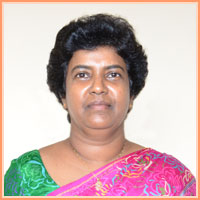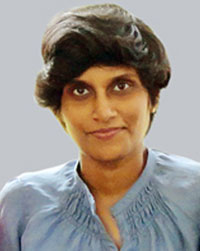News
Impact of pandemic-fallout on women and children
As the holidays of the Sinhala and Tamil New Year come to an end and Sri Lanka looks towards getting on with life in the new normal brought about by COVID-19, medical professionals spoke to the Sunday Times about the impact of the pandemic-fallout on women and children and how to alleviate it.

Prof. Sampatha Goonewardena
The discussion was organized by the Chairperson of the Women’s Health Committee of the Sri Lanka Medical Association (SLMA), Prof. Sampatha Goonewardena.
Looking closely at the large number of women working in the healthcare sector, Dr. Aruni Hapangama of the Department of Psychiatry, Faculty of Medicine, University of Kelaniya said that from early last year when the COVID-19 outbreak started, it was an unprecedented time. For women healthcare workers, it was all about not only looking after their patients but also their families and themselves.
“There were many challenges we had to face – wearing Personal Protective Equipment (PPE) while working, masks when not working and taking the vaccine. It was something new for us in Sri Lanka,” said Dr. Hapangama, explaining that data on the pandemic have shown that it has affected males and females differently. Even though more males have died of COVID-19, there have been more infections among females.
She said that studies in some countries, especially in China, have shown this pattern as most of their healthcare workers are females. Sri Lanka does not have the exact data, but a study titled ‘Impact of COVID-19 on healthcare workers’, is underway by Kelaniya’s Faculty of Medicine and the results are awaited.
According to Dr. Hapangama, when considering the female workforce in the country, there are women from different professions spanning various levels, from academics to labourers. They are also wives, mothers and daughters who play a second role in their households. This caused them severe worry – “will we get the infection during work and will we take it home, endangering our loved ones. This uncertainty was stressful”.

Dr. Aruni Hapangama
When asked whether this issue has been addressed and the fear has abated a little, she said it had not happened fully as there was concern whether other patients could be silent carriers of the disease and whether they have visited places from where they could have picked up the disease. “We just don’t know.”
“Our patients could be carriers without knowing they are. You can meet them anywhere and even though people within the Colombo and Gampaha districts have received the first dose of the vaccine that does not mean that it will protect the whole community. This is while even if we take all health precautions, it does not mean that the worry will go away,” she said.
The answer to these worries, said Dr. Hapangama, is to develop coping skills while adhering to the health precautions of hand washing, mask-wearing and maintaining social distance. Some level of anxiousness is needed to keep the balance and take the necessary precautions. But if it goes to the next level – where your anxiety is affecting your day-to-day functioning, it becomes pathological. If everything gets impaired because of worrying, then it is time to take note and act on it.
Some of the disorders that can come about are panic disorder, adjustment disorder and depression.
What are the symptoms?
“If you cannot sleep as usual and you are sad and worried and there is loss of appetite, it would be time to take heed,” says Dr. Hapangama, explaining that “you will notice the difference. If earlier, you were listening to songs and handling your children’s work, but now don’t have the energy to do that”.
Such a situation should last at least two weeks – the feeling of helplessness, hopelessness, the heart beating fast, having a choked feeling, etc., could be signs of anxiety, it is learnt.
She advises that “if you notice any of these, there are several things that can be done – going to the nearest doctor or the closest hospital as any district hospital or teaching hospital has a psychiatrist who could provide psycho-social help for you to cope”.
What can you do?
Dr. Hapangama suggests some techniques to overcome these issues but stresses that if they are not successful, the important thing is to seek medical support.
“First you need to notice/identify that there seems to be some problem. Take a look at it – yes, I am getting angry and snapping at my children unnecessarily. You need to pick it up from there. You could try to move away when such a situation arises or count from 1 to 10. You can listen to some music, you can go around your house and do something else to calm yourself. If you think this is not helping, you need to seek professional help,” she said.
Advising strongly that alcohol consumption and non-prescribed medication should be avoided even if a person thinks it leads to relaxation, she said that it is not healthy and it would lead to addiction.
“If you take alcohol and other non-prescribed medicine, you will have to face harder consequences. One is dependency, which is very difficult to treat and the other is that non-prescribed medicines might affect your health,” she added.
Dr. Hapangama says – Go to bed early, if you are able to finish your work, around 9.30 p.m. Follow the usual things you do before bed. Use your bed for sleeping, not to watch TV or movies or for studying. Do what makes you feel comfortable. You should not do heavy exercises at night. They should be done in the early evening. If these do not work, seek medical help.
| Impact on doctors: Data to be collected soon The Women’s Health Committee is due to collect data shortly through an online Google form sent to all registered doctors on the impact COVID-19 has had on them with regard to stress and anxiety, said Prof. Sampatha Goonewardena. She says, “We also want to gather data and analyze the problems that doctors who have school-going children who needed to engage in online learning during the past year faced with their children at home and them being at work.” | |


